10 Best Forex Brokers with High Leverage
Discover the top 10 forex brokers with high leverage, compare key features, and choose the right platform for your trading style.
.jpeg)
Navigating the complexities of trading futures options can feel overwhelming, especially when considering the leverage options in the forex market. But when used wisely, high leverage can be a powerful tool for maximizing your trading potential with limited capital. This guide will explore the benefits and risks of high leverage, provide tips on finding a reputable broker, and help you understand how to make money on forex by leveraging smart strategies and disciplined risk management.
One option worth exploring is AquaFunded's funded trading program, which provides access to high-leverage forex accounts with professional guidance and support. This resource can be valuable if you want to learn how to use leverage safely and effectively.
Importance of Choosing the Right Forex Broker
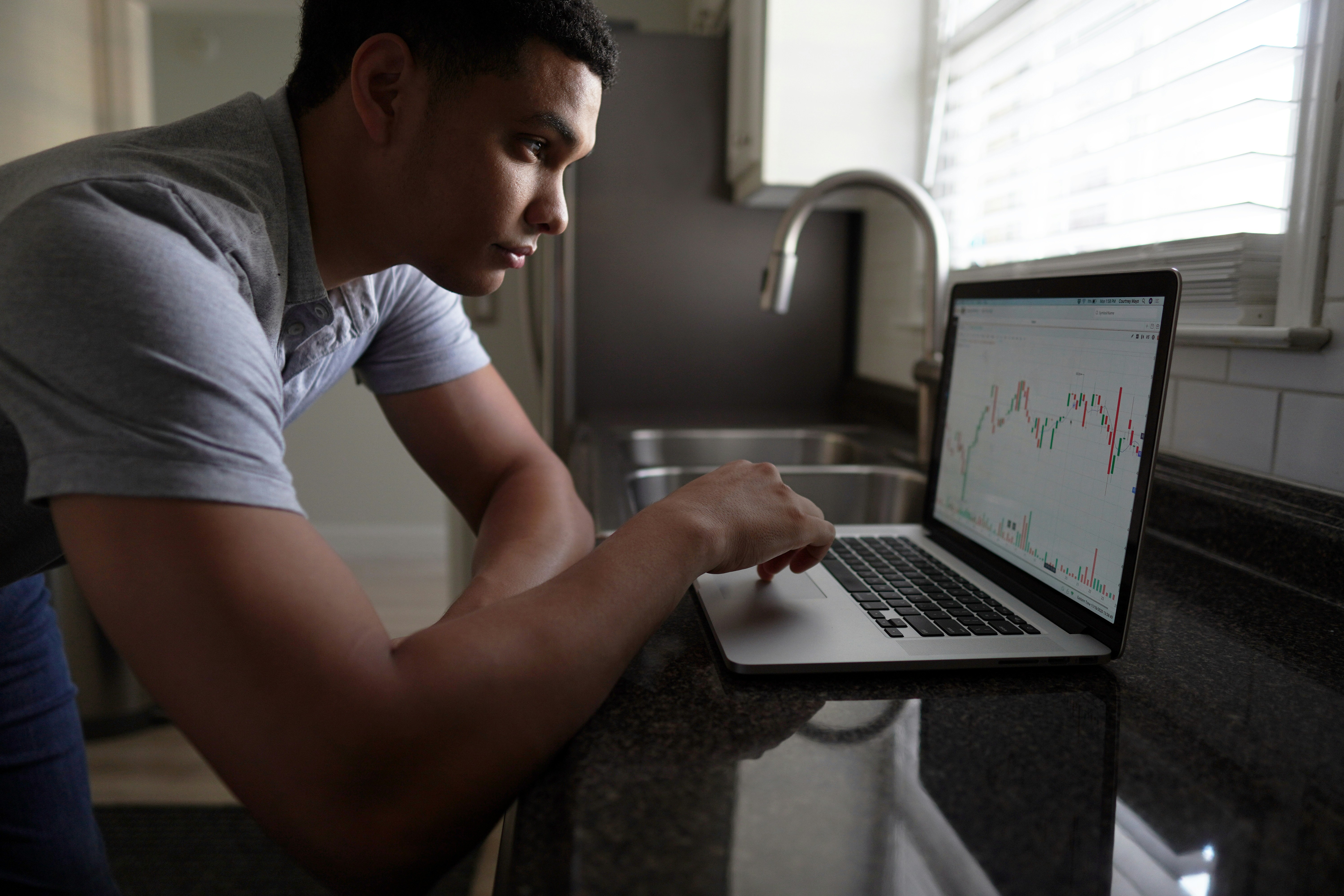
Check for Regulatory Compliance
First things first, make sure your broker is legit. Regulatory compliance is your first line of defense against scams. A broker regulated by authorities like the FCA or CFTC is more likely to play by the rules. This oversight protects your funds and ensures fair trading practices. So, don’t skip this step. Always check for regulatory compliance.
Evaluate Trading Costs
Trading isn’t free, and costs add up. Look at the spreads, commissions, and other fees your broker charges. Lower costs can make a huge difference in your bottom line. Some brokers might offer zero commissions but have wider spreads. Others might charge a small commission but offer tight spreads. Find the balance that suits your trading style.
Assess the Trading Platform
You’ll spend a lot of time on the trading platform, so ensure it’s user-friendly and reliable. Does it offer the tools you need for analysis? Is it easy to navigate? A clunky platform can lead to mistakes, costing you money. Also, ensure it’s compatible with your devices, whether you’re trading on a computer, tablet, or phone.
Understand Account Types and Leverage
Different brokers offer different account types and leverage options. Make sure the broker provides an account type that matches your trading goals. Whether you’re a beginner or a pro, you’ll want an account that fits your needs. Leverage is another critical factor. High leverage can amplify profits, but it also increases risk. Choose a leverage level you’re comfortable with.
Evaluate the Broker’s Reputation
A broker’s reputation is a valuable indicator of reliability. Look for reviews and testimonials from other traders. Are there any common complaints? How does the broker handle issues? A broker with a solid reputation will likely provide a good trading experience.
Customer Support Matters
Good customer support can be a lifesaver when you encounter issues. Ensure the broker offers multiple support channels, like live chat, email, and phone. Test their response times and see how helpful they are. Quick and competent support can make a big difference in resolving problems.
How to Choose the Right Forex Broker

1. Regulation: Trust, Safeguards, and Peace of Mind
Regulation is crucial when choosing a forex broker. It means you're dealing with a trustworthy, transparent broker. Regulatory agencies enforce standards to protect traders, ensuring fair practices. Regulated brokers must keep client funds separate from business assets, safeguarding your money if they become insolvent.
They must also offer clear, upfront information about fees and services. These brokers face regular audits to ensure fair trading. Having a dispute with a regulated broker? The regulatory body can mediate, giving you a path to resolution. Unregulated brokers offer no such safety net and may operate illegally.
2. Trading Platform: Your Trading Headquarters
The trading platform is your command center, where you execute trades and manage positions. A user-friendly, reliable platform is essential. Look for features like multiple order types, fast execution, and automated and social trading tools.
A good platform works well on both desktop and mobile. It should also provide robust technical and fundamental analysis tools, including charting tools, indicators, news feeds, and economic calendars. A diverse trading platform lets you explore various asset classes, helping you diversify and manage risk effectively.
3. Trading Conditions: The Fine Print That Matters
Trading conditions set the terms for your trading activity. They're crucial because they impact your risk and reward potential. Key conditions include leverage and margin levels, which determine how much capital you can control with your own money. Consider brokers offering negative balance protection to prevent losses beyond your initial investment. Trading costs, including spreads, commissions, and inactivity fees, directly affect profitability. Be aware of trading hours, especially for assets with special schedules. Know if there are trade size limits to see if the broker fits your trading goals.
4. Tools and Resources: Sharpening Your Trading Skills
A good broker offers tools and resources to help you become a better trader. Look for educational content like eBooks, videos, webinars, and expert market analysis. Handy tools like trading calculators, risk management tools, and an economic calendar can enhance your trading efficiency. Some brokers offer exclusive resources like social trading platforms and advanced analytical tools. Access to a free demo account is vital for practicing without risk.
5. Payment Methods: Getting Your Money In and Out
Your ultimate goal is to make money, so payment methods matter. Choose a broker that offers safe, secure, and convenient options, like credit/debit cards, bank transfers, and eWallets. As a beginner, consider brokers with low initial deposit requirements. Check how quickly deposits and withdrawals are processed. You want to start trading soon after a deposit and withdraw smoothly when it’s time to enjoy your profits.
6. Customer Support: A Lifeline When You Need It
Reliable customer support is crucial in the fast-paced world of online trading. Quick assistance is essential. Evaluate support based on communication channels, availability, languages offered, and quality of service. You want a support team that's friendly, knowledgeable, and quick to resolve issues.
If you’re looking to turn your trading skills into substantial profits without risking your capital, consider AquaFunded. With our funded trading program, you can access accounts up to $400K and benefit from the most flexible trading conditions in the industry.
Related Reading
- Forex Trading Signals
- Forex Trading Sessions
- Forex Trading Software
- Best Forex Pairs to Trade
- Oanda vs Forex.com
- Best Forex Brokers Dubai
- Most Volatile Forex Pairs
- Best Forex Prop Firms
10 Best Forex Brokers with High Leverage
1. AquaFunded
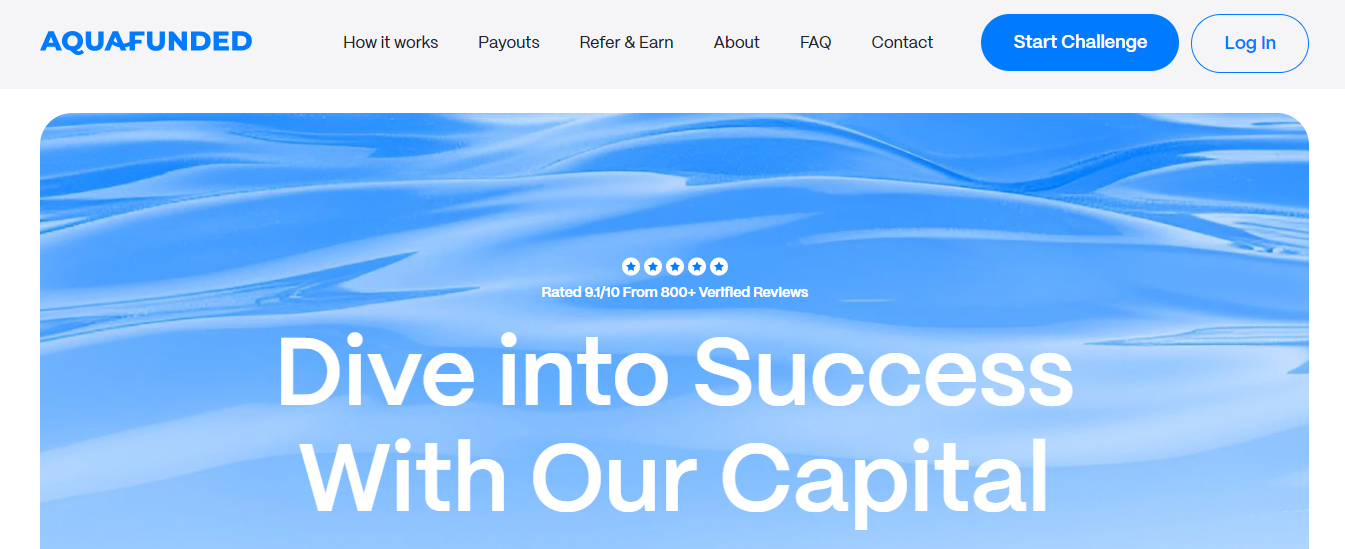
AquaFunded allows traders to turn their skills into substantial profits without risking their capital. You gain access to accounts up to $400K with flexible trading conditions: no time limits, easy profit targets, and up to 100% profit split. Join over 42,000 traders worldwide who have collected over $2.9 million in rewards, with payments guaranteed in 48 hours. Start trading with instant funding or prove your skills through customizable challenge paths.
2. FX Centrum
/image
FX Centrum stands out for providing some of the highest leverage ratios in the industry, reaching up to 1:1000. Regulated by the Financial Services Authority in Seychelles, this broker offers a competitive environment for those comfortable with an offshore setup. Access a wide range of markets, including Forex, commodities, indices, stocks, and cryptocurrencies.
Pros
- Leverage up to 1:1000 for small capital traders.
- Broad asset selection, including crypto.
- User-friendly platform with regional banking support.
Cons
- Offshore regulation with less stringent oversight.
- Limited advanced features for professional traders.
3. Exness
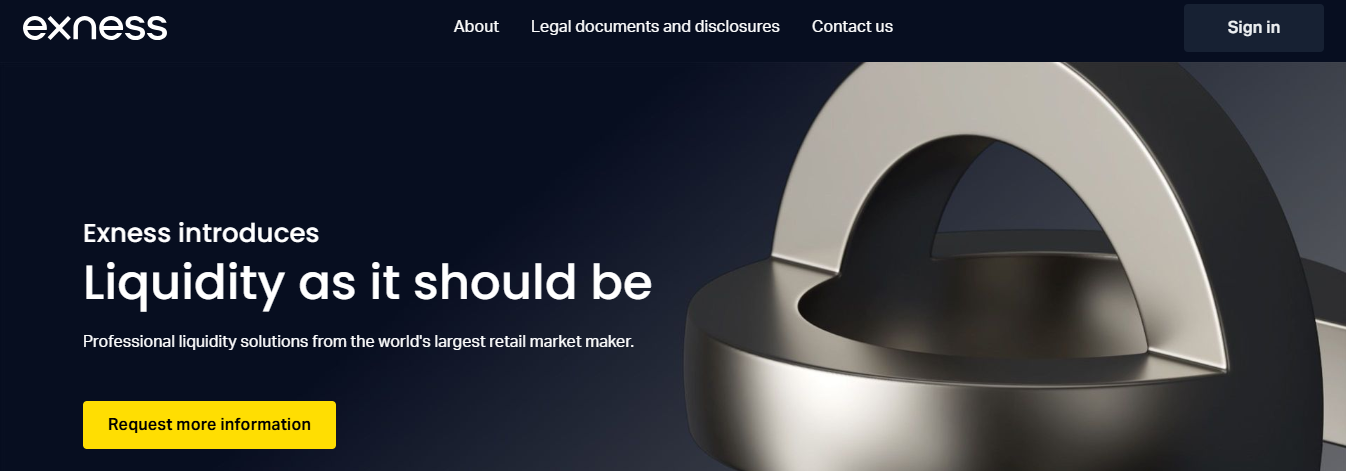
Founded in 2008, Exness is regulated by multiple authorities, including the UK FCA and CySEC. Trade over 234 financial instruments using MT4, MT5, or the feature-rich Exness Web Terminal. Enjoy high leverage and benefit from Trading Central signals and research.
Pros
- Global regulation for added security.
- High leverage with top platforms.
- Access to quality trading signals and research.
Cons
- Not available for UK and European retail clients.
4. OQTima
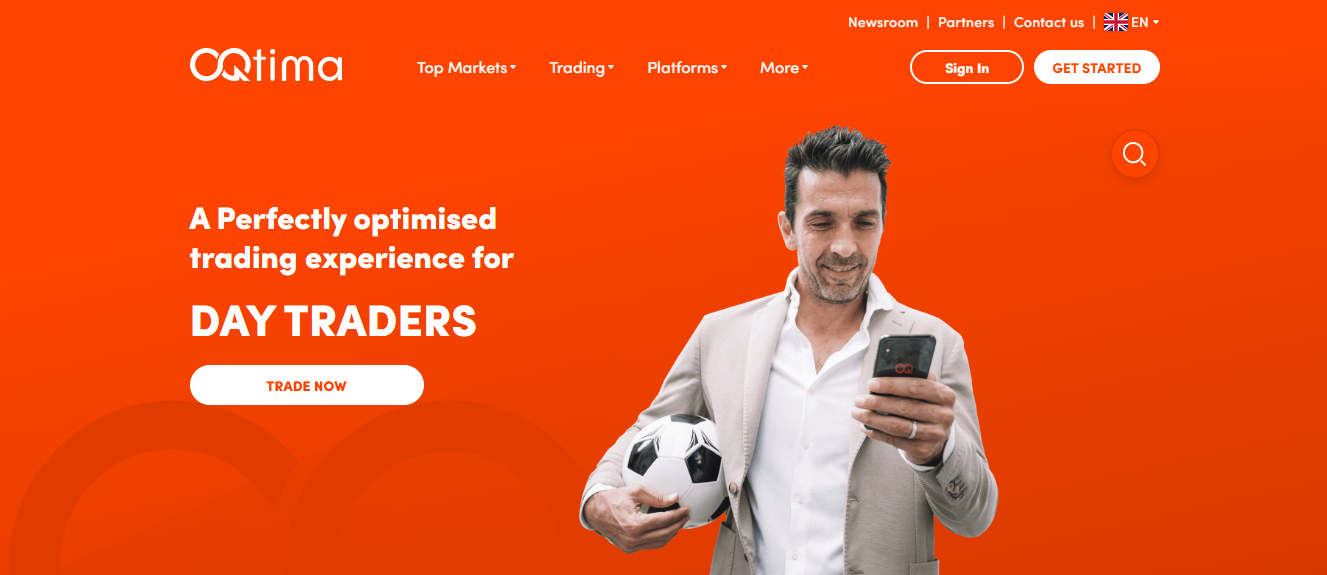
OQTima combines high leverage with a strong focus on localization, offering leverage up to 1:1000. Regulated by the Financial Services Authority in Seychelles, it provides multilingual support and regional payment options. Access advanced charting tools and automated trading support on MT4 and MT5.
Pros
- High leverage is suitable for most strategies.
- Strong focus on regional accessibility.
- Transparent fee structure with no hidden charges.
Cons
- Limited recognition outside specific regions.
- Fewer advanced features compared to global brokers.
5. FXTM
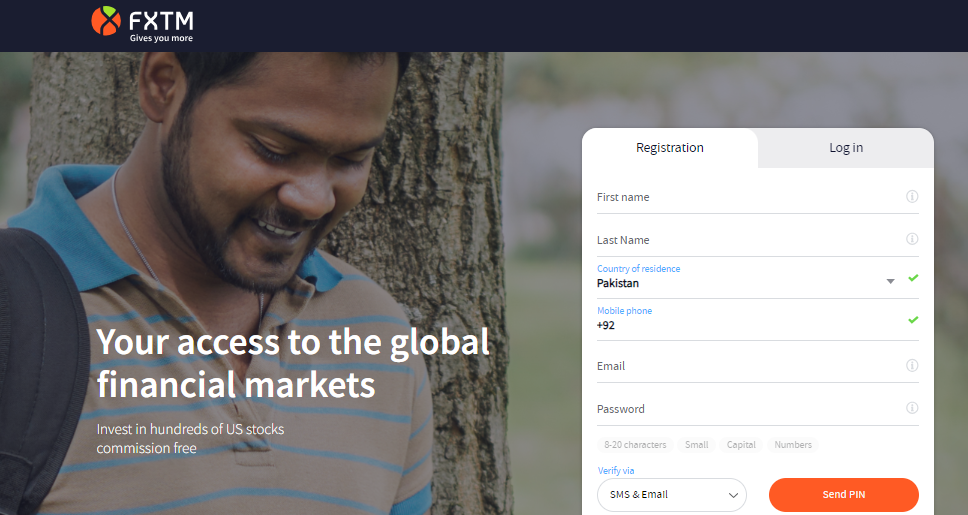
FXTM is an ECN broker offering interbank market spreads. Founded in 2011, it’s regulated by the UK FCA, CySEC, and others. Professionals can access commission-free ECN accounts from advanced trading platforms and become strategy managers on its copy trading platform.
Pros
- ECN trading accounts with competitive commissions.
- Trading signals are available.
- Profit as a strategy manager.
Cons
- No proprietary web or desktop platform.
6. Tickmill
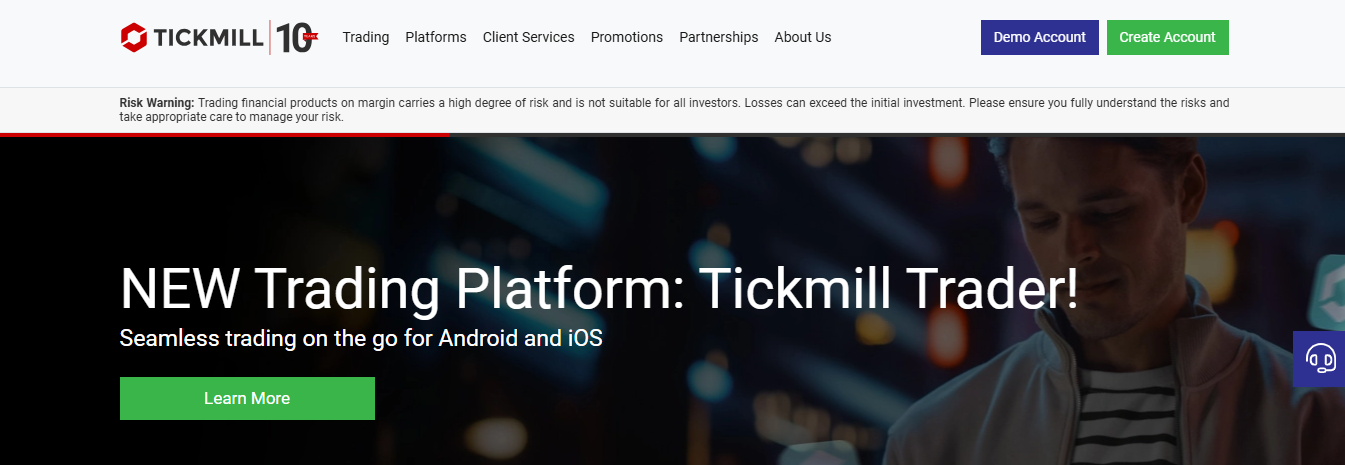
Tickmill is known for transparent pricing, low spreads, and competitive leverage. Tickmill Ltd, regulated by the Financial Services Authority in Seychelles, offers leverage up to 1:1000. Trade on MT4 and MT5, focusing on Forex, indices, and more.
Pros
- Leverage up to 1:1000 for some clients.
- Tight spreads and fast execution speeds.
- Comprehensive educational resources.
Cons
- Leverage restrictions in highly regulated jurisdictions.
- Limited range of non-Forex assets.
7. OCTA
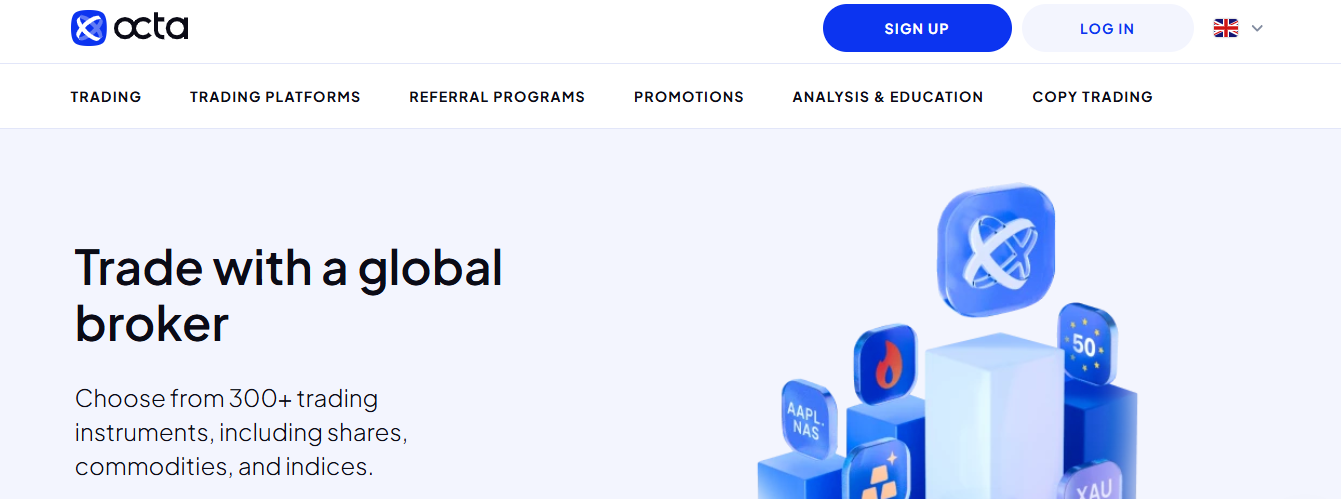
OCTA provides a wealth of research and educational materials. Founded in 2011, one entity is regulated by CySEC, while another is not. Beginners can access a free demo trading account and commission-free trading account to trade over 80 financial instruments.
Pros
- Free demo and commission-free trading accounts.
- Extensive platform guides and webinars.
Cons
- Research and educational content with the unregulated entity.
8. Pepperstone
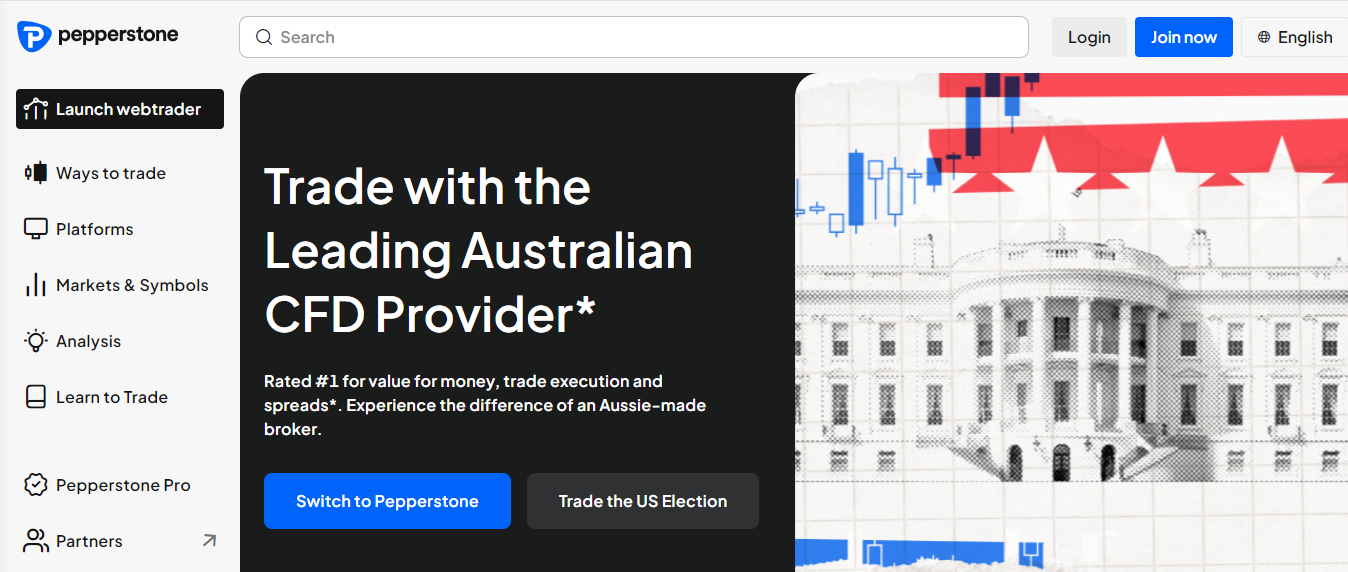
Pepperstone is a globally regulated forex and CFD broker founded in 2010. Access trading in over 1,400 instruments via platforms like MT4, MT5, cTrader, TradingView, and the Pepperstone mobile app.
Pros
- Fast execution and great platform selection.
- Extensive research content and tradable instruments.
Cons
-No proprietary web or desktop platform.
9. IC Markets

IC Markets is renowned for ultra-low fees, raw interbank spreads, and zero commissions. Regulated by CySEC, ASIC, and others, it’s ideal for high-frequency traders seeking low costs and fast execution.
Pros
- ECN raw spread accounts with low fees.
- MT4, MT5, and cTrader platforms are available.
- Ultra-fast execution.
Cons
- Advanced features may overwhelm beginners.
10. FP Markets
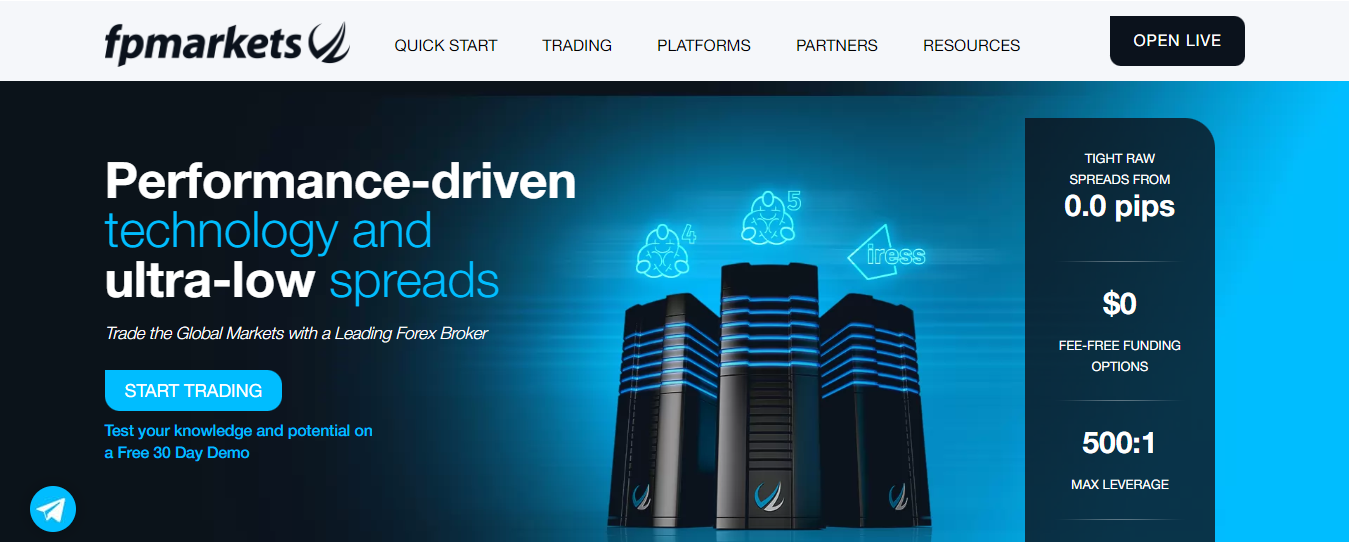
FP Markets, founded in 2005, is regulated by CySEC, FSCA, and ASIC. The FP Markets mobile app lets you trade over 70 currency pairs and access shares, commodities, indices, and cryptos.
Pros
- MT4, MT5, and mobile app access.
- Major and exotic currency pairs.
- ECN pricing from all mobile apps.
Cons
- No drawing tools in the mobile app.
Related Reading
- Major Forex Pairs
- US Prop Firms
- Forex Trading for Dummies
- Forex Trading Bots
- Forex Trading in Dubai
- Forex Trading Profit per Day
- Best Funded Account Forex
- What Is Margin in Forex Trading
- What Is a Pip in Forex Trading
- Forex Market Sentiment
- Forex MT4 Brokers
15 Tips for Successful Forex Trading

1. Unlock the Potential with AquaFunded
Imagine trading without risking your own money. AquaFunded lets you leverage your skills with access to accounts as large as $400K. Enjoy flexible conditions, no time constraints, attainable profit targets, and a profit split of up to 100%. Over 42,000 traders have already benefited, collecting more than $2.9 million in rewards. Instant funding or customizable challenges await. This is your opportunity to trade confidently and keep what you earn.
2. Choose a Broker You Can Trust
Your first move in forex trading is finding a reliable broker. The broker must be regulated by reputable financial authorities. Look for user-friendly platforms and educational resources to guide you. Ensure their currency pairs, fees, and spreads fit your trading goals.
3. Craft a Plan and Stick to It
A solid trading plan is your roadmap. Define your profit goals, risk tolerance, and evaluation criteria. Stick to your plan. You'll be more rational before placing a trade and often less so afterward. Consistency is key.
4. Setting Up Your Trading Account
Once you've chosen a broker, open a trading account by completing an online application, submitting ID documents, and funding your account. Brokers offer various account types, including standard, mini, and demo, for practice. Use demo accounts to test your strategy in a risk-free environment.
5. Practice Makes Perfect
Use a practice account to test your trading plan in real market conditions without risking your capital. This is your chance to experience trading without financial loss and refine your strategy.
6. Learn the Basics of Forex
Understanding forex basics is crucial. Familiarize yourself with key terms like pips, spreads, leverage, and margins. Grasping these concepts will help you navigate the market more effectively.
7. Focus on Major Currency Pairs
Start with major pairs like EUR/USD or GBP/USD. They're highly liquid and usually have lower spreads. Concentrate on a few pairs initially to avoid getting overwhelmed.
8. Forecast Market Movements
Predict market movements using news, financial data, and technical analysis tools. Most traders combine these methods. Use every tool to identify potential trading opportunities in moving markets.
9. Find Your Trading Style
Identify your trading style before developing a strategy. Day, swing, and position trading have their timeframes and setups, and your style will guide your decisions.
10. Use Stop-Loss and Take-Profit Orders
Stop-loss orders limit losses by closing a trade at a predetermined price. Take-profit orders lock in profits when a target is reached. These tools help manage risk and control exposure.
11. Analyze the Market
Perform both technical and fundamental analysis. Use charts and indicators to predict price movements. Look at economic factors and news that could affect currency values. A combined approach gives a fuller market view.
12. Keep an Eye on Your Trades
Monitor your trades regularly. Markets can be volatile, so be ready to adjust. Stay informed with the latest news and adapt your strategy as needed.
13. Control Your Emotions
Avoid "revenge trading" after a loss. Stick to your plan and recover losses gradually. Emotion-driven decisions rarely end well.
14. Slow and Steady Wins the Race
Consistency is crucial in trading. All traders face losses, but maintaining a positive edge can lead to success. Stick to your plan with patience and discipline.
15. Learn from Every Trade
Review your trades after closing them. Analyze what worked and what didn’t. A trading journal can help track progress and improve strategies over time.
Join Our Funded Trading Program Today - Trade with our Capital and Keep up to 100% of the Profit.
In the world of trading, finding a foothold can be tricky. AquaFunded offers a path to turn your skills into real profits without putting your savings on the line. Picture this: accounts up to $400K, flexible trading terms, and a profit split that can reach 100%. It’s a generous setup that gives you room to breathe and trade freely.
Over 42,000 traders have already pocketed more than $2.9 million in rewards from AquaFunded. Plus, their 48-hour payment guarantee means you’re not left waiting. Whether you want to dive in with instant funding or tackle a challenge to prove your prowess, you get to keep what you earn.
Related Reading
- Best Laptop for Trading Forex
- Best AI for Forex Trading
- Best Leverage for Forex
- Prop Trading Salary
- Instant Funding Forex Prop Firms
- List of Forex Prop Firms
- Top Forex Traders in the World
- Best Forex Broker for Small Accounts



